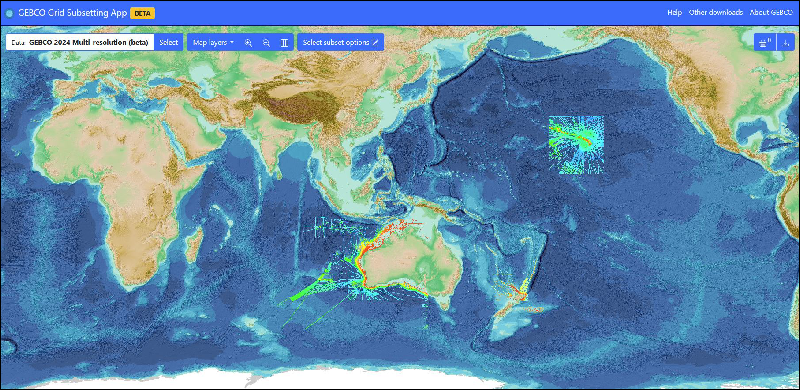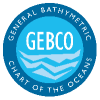Global ocean & land terrain models
GEBCO’s current gridded bathymetric data set, the GEBCO_2024 Grid, is a global terrain model for ocean and land, providing elevation data, in meters, on a 15 arc-second interval grid. It is accompanied by a Type Identifier (TID) Grid that gives information on the types of source data that the GEBCO_2024 Grid is based.
This release includes a version of the grid with under-ice topography/bathymetry information for Greenland and Antarctica.
- Download global coverage grids
- Download data for user-defined areas
- Try our new beta release download app and access data at multiple resolutions
More information about the grid, its terms of use and attribution. Provide feedback, tell us how you are using the grid.
GEBCO releases a new global grid every year, generally in late June. Find out more about the grid generation process.
Download global coverage grids
The GEBCO_2024 Grid and TID Grid can be download as global files in netCDF format or a set of 8 tiles (each with an area of 90° x 90°), giving global coverage, in Esri ASCII raster and data GeoTiff formats. The data filea are included in a zip file along with the data set documentation.
| GEBCO_2024 Grid (ice surface elevation) | netCDF (4 Gbytes, 7.5 Gbytes uncompressed) | Data GeoTiff (4 Gbytes, 8 Gbytes uncompressed) | Esri ASCII raster (5 Gbytes, 20 Gbytes uncompressed) |
| GEBCO_2024 Grid (sub-ice topo/bathy) | netCDF (4 Gbytes, 7.5 Gbytes uncompressed) | Data GeoTiff (4 Gbytes, 8 Gbytes uncompressed) | Esri ASCII raster (5 Gbytes, 20 Gbytes uncompressed) |
| GEBCO_2024 TID Grid | netCDF 90 Mbytes, 4 Gbytes uncompressed) | Data GeoTiff(96 Mbytes, 7 Gbytes uncompressed) | Esri ASCII raster (108 Mbytes, 9.5 Gbytes uncompressed) |
Please note that the size of the uncompressed files.
Download data for user-defined areas
Use our application to select and download data in netCDF, Esri ASCII raster and data GeoTiff formats.

Multi-resolution data
We are working to provide bathymetry data at higher resolutions than the standard 15 arc-second interval global grids. Currently, data at multiple resolutions is only available for certain test areas.
Try our beta release app, https://betadownload.gebco.net, to access the available data. Please provide feedback on the app to the Seabed 2030 Global Center ( gdacc@seabed2030.org ).
Find out more about the multi-resolution gridded data sets.
All GEBCO's grids are available to download via the app.

The ‘rainbow colours’ show areas of multi-resolution data plotted on the 15 arc-second GEBCO grid (areas of blue shaded-relief).
Data set attribution for GEBCO_2024 Grid
If the data sets are used in a presentation or publication then we ask that you acknowledge the source. This should be of the form:
GEBCO Compilation Group (2024) GEBCO 2024 Grid (doi:10.5285/1c44ce99-0a0d-5f4f-e063-7086abc0ea0f)
Terms of use
The GEBCO Grid is placed in the public domain and may be used free of charge. Use of the GEBCO Grid indicates that the user accepts the conditions of use and disclaimer information.
Data set errata and known issues
Although every care is taken during the development of the GEBCO bathymetric grids, errors can occasionally occur, and can be reported to the Seabed 2030 Global Centre ( gdacc@seabed2030.org ). Known issues can be viewed on our errata pages.
Type Identifier (TID) Grid
The TID grid identifies the type of source data that the corresponding grid cells in the GEBCO Grid are based on. Further information about the TID codes can be found in the accompanying documentation.
Find out more about the TID Grid from our StoryMap. English and Spanish language versions are available.
Note on vertical datum and GEBCO's grids
GEBCO's global elevation models are generated by the assimilation of heterogeneous data types assuming all of them to be referred to mean sea level. However, in some shallow water areas, the grids include data from sources having a vertical datum other than mean sea level. We are working to understand how best to fully assimilate these data.
Provide feedback
To help us improve our products and services, use our form to provide feedback on the GEBCO grid.





